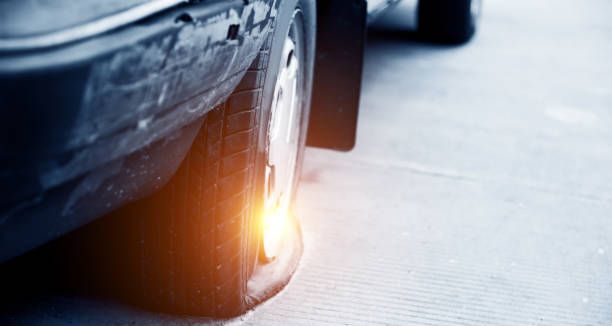There's nothing worse than experiencing a major blowout while driving down the interstate — especially in inclement weather. Although flat tires can't always be prevented, staying ahead of general tire wear can save you from some pretty costly repairs. Before you limp your vehicle down the road to the nearest service center, learn how driving on a flat can negatively affect your car and what you should do if this happens to you.
What Causes Flat Tires?
Flat tires can occur for many reasons, and although they can't always be prevented, staying ahead of general tire wear can save you from some pretty costly repairs. Pay special attention to tire pressure and tread depth, and avoid driving on them beyond their useful life. Other causes of flat tires that may not always be within your control can include punctures from foreign objects like industrial screws and glass, slow leaks, and road hazards such as potholes and uneven roads.
How Far Can You Drive on a Flat?
The answer is simple — driving on a flat tire short distances is rarely a good idea but may be the safest thing to do to get you and your vehicle away from busy, speeding traffic. If a blowout happens while you're on the road, try to minimize the amount of time spent driving on it. Turn on your hazard lights, avoid smashing down on the brakes, and slowly navigate your vehicle to the nearest, safest location. Then, with the help of your car owner's manual or roadside assistance, install your spare until you're able to locate a nearby Tires Plus for repair or replacement.
If your vehicle is equipped with Run Flat tires, you can drive up to 50 miles at 50 mph on a punctured tire — which should be plenty of time to get you to your nearest Tires Plus! If your vehicle isn’t equipped with Run Flat tires, you can shop online or visit a Tires Plus near you to talk to our tire experts about the benefits of Run Flat tires.
What Happens if You Drive on a Flat Tire?
Further Tire Damage
A flat is not always the end all be all of your vehicle's tires — unless you continue to drive on them. Low air pressure, small punctures, and other issues are usually able to be repaired without having to purchase a new set.
In short, avoid driving unnecessarily on deflated tires, as this can increase the risk of puncture expansion and irreparable damage to the internal and external structure of both your vehicle and your tires.
Bent or Warped Rims
When driving on a flat tire, not only are you damaging the structure of your tires, but you're also concentrating more weight on your rim edges. Since these components are not meant to touch the road's surface, they can become bent, warped, or permanently damaged. Whereas before, you might have needed a simple tire repair or replacement, you could accrue more costly repairs by having to have new rims installed.
General Damage to Your Vehicle
If you continue to drive on a flat tire and it starts to degrade, you may experience further damage to several essential components on your vehicle (i.e., brake lines, rotors, suspension parts, fenders, etc.). The result — higher repair costs and increased safety concerns for you, your passengers, and other drivers on the road.
Overall Safety Hazards
Your tires aren't just designed to keep your vehicle rolling smoothly. They support the entire weight of your car, grip the road so that you have proper traction, allow you to navigate turns and stops with ease, and so much more.
When these functions are compromised, they can put you at serious risk on the road by limiting steering abilities and overall control of your vehicle. If you notice that a tire has gone flat, stay proactive against these dangers by having them repaired or replaced immediately.
Proper Tire Care
To help combat flat tires, implement these best practices regularly.
- Inspect your tires for surface cracks or bulging
- Keep an eye out for punctures or foreign objects (screws, nails, etc.)
- Avoid heavy loads that may weigh down on your tires
- Avoid aggressive driving and hard stops
- Maintain proper tire pressure
- Replace your tires when necessary
- Get regular tire rotations
Now that you know what happens when you drive on a flat tire, you may second-guess your decision to continue riding on them without getting a replacement. Whether you need tire repair or a new one installed, head to your nearest Tires Plus for all of your tire needs.



